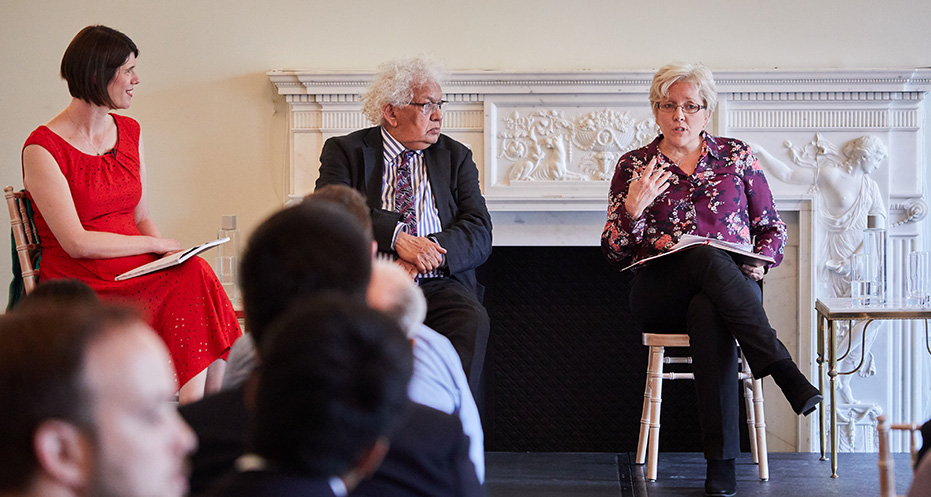Driving commercial and political engagement between Asia, the Middle East and Europe
Driving commercial and political engagement between Asia, the Middle East and Europe
Driving commercial and political engagement between Asia, the Middle East and Europe

There are major opportunities for UK companies within China’s Belt and Road Initiative, but the project is not everything it seems, according to leading journalist and former BBC China editor, Carrie Gracie.
Speaking at the launch of The University of Nottingham Asia Research Institute – a new centre bringing together world-leading research on Asia – Gracie highlighted the potential for British businesses in Beijing’s flagship infrastructure programme.
“It would be smart for people to pay attention to it, to understand it, and if you’re in the private sector, surf it wherever possible,” she said. “If you’re a UK business and you’re trying to get some contracts, then obviously there are places along the various routes in South Asia where the UK has some history, and where the Chinese may need some financial services or construction consultancy support.”
Gracie identified a number of sectors where the opportunities are particularly profound.
“When I was looking at this, and at what’s in it for British business, it was sectors such as financial services, insurance, consultancy, construction, and architecture,” she said.
The Belt and Road Initiative (BRI) is President Xi Jinping’s flagship policy to enhance connectivity between Asia, Europe and Africa through new trade-focused infrastructure, including roads, railways, bridges and ports.
However, while the BRI will improve trade links and bring economic benefits, some commentators have raised concerns about the project’s geopolitical dimensions.
Economist Lord Desai, also speaking at the event at Asia House on Tuesday, invoked Shelley’s Ozymandias in a colourful and rather frank appraisal of the BRI, which he described as “completely unrequired.”
“They have surplus capacity in steel and they want to build railroads everywhere, in the middle of nowhere,” he said. “In 15 years there will be deserts of railroads which no one is going to use.”
“I cannot understand the logic of the BRI.”
Gracie, who traversed swathes of proposed BRI routes last year to produce in-depth and insightful reports on the project, agreed that there are questions over some of its necessity. “I have seen the railroads to nowhere and I do believe that’s a problem,” she said.
But that’s not the case in Pakistan, however, as event moderator Professor Katharine Adeney, Director of the University of Nottingham Asia Research Institute, pointed out.
“My expertise on this is in Pakistan, where it very much is operational on the ground,” she said. “They are ploughing US$62 million into projects there.”
This contrast encapsulates the debate around BRI, which is by no means a unified and cohesive plan, but rather a grouping of diverse infrastructure programmes spanning thousands of miles.
For Gracie, this is an important point. Not everything that’s said about the BRI should be taken literally. The project is as much about PR for China as it is about closing the Eurasian infrastructure gap, she suggested.
“It’s about saying: ‘We’re China, we’ve arrived, we’ve done great things over the past 40 years, we’ve got a trillion dollars of capital to invest in this, and everyone’s got to listen.’”
And UK companies should listen.
“British business should have a look at it,” Gracie concluded. “There will be bits of it that will work, for sure, and bits of it that won’t.”
BRI was just one talking point in a wide-ranging discussion exploring the post Brexit trading landscape and emerging power centres in Asia. Professor Adeney began the discussion by steering towards the UK’s trading relationships with Asia post Brexit. How will Britain’s withdrawal from the EU affect current ties?
“We are the biggest destination for direct investment from China,” Gracie said. “However, one of the key advantages of this, from China’s point of view, is frictionless access to the EU. So withdrawal from the EU for the UK via Brexit is obviously a question mark for Chinese companies.”
Another area of uncertainty is Free Trade Agreements, which “take a very long time,” Lord Desai said. He predicted bumpy relations with India as the UK explores stronger trade ties in a post Brexit world.
To illuminate his point, he shared an insightful story about a meeting he had with Indian Prime Minister Narendra Modi about a book he co-authored on India – UK relations. Lord Desai cited Modi as saying: “India and the UK is alright, but what about the EU? Because what remains is still the larger market and we’re interested in the larger market, we’re not interested in the UK just for sentimental reasons.”
As a trading nation, India looks to the biggest markets. “Why don’t you write another book on India and the EU?” Modi apparently asked.
For Lord Desai, the UK has much work to do in repairing relations with the Commonwealth, which he argued has been neglected in recent decades.
“When the UK joined the EU, which I supported, the argument was to cut away from the Empire and go to the neighbours. Now you cut away from the neighbours and go to the Empire. In the meantime, the Empire has grown up.”
“How are we going to sell ourselves to Asia? That is the problem,” he added.
The obvious conclusion from the lively discussion was that, while there is vast potential for UK trade with Asia, it is set to be a complex and uncertain business. The launch of the University of Nottingham Asia Research Institute is therefore extremely timely, and will be a welcome addition for Asian focused commentators, businesses and media around the globe.
